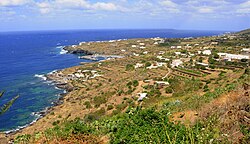Cossyra
| Pantelleria | ||
|---|---|---|
| Comune | ||
| Comune di Pantelleria | ||

Panorama of Pantelleria
|
||
|
||
| Location of Pantelleria in Italy | ||
| Coordinates: 36°50′N 11°57′E / 36.833°N 11.950°ECoordinates: 36°50′N 11°57′E / 36.833°N 11.950°E | ||
| Country | Italy | |
| Region | Sicily | |
| Province / Metropolitan city | Trapani (TP) | |
| Frazioni | Balata dei Turchi, Buccuram, Bugeber, Campobello, Contrada Venedise, Cufurá, Gadir, Garitte Karuscia, Khamma, Karuscia, Khaddiuggia, Khamma di Fuori, Madonna delle Grazie, Martingana, Rekhale, San Michele, Santa Chiara, San Vito, Scauri, Scauri Basso, Sciuvechi, Sibà, Sopra Gadir, Tracino, Villaggio Tre Pietre | |
| Government | ||
| • Mayor | Salvatore Gabriele | |
| Area | ||
| • Total | 83 km2 (32 sq mi) | |
| Elevation | 836 m (2,743 ft) | |
| Population (30 April 2009) | ||
| • Total | 7,729 | |
| • Density | 93/km2 (240/sq mi) | |
| Demonym(s) | Pantellerian | |
| Time zone | CET (UTC+1) | |
| • Summer (DST) | CEST (UTC+2) | |
| Postal code | 91017 | |
| Dialing code | 0923 | |
| Patron saint | St. Fortunatus | |
| Website | Official website | |
Pantelleria (Sicilian: Pantiddirìa), the ancient Cossyra (Arabic:قوصرة Qawṣra, Maltese: Qawsra, now Pantellerija, Ancient Greek Kossyra, Κοσσύρα), is an Italian island in the Strait of Sicily in the Mediterranean Sea, 100 km (62 miles) southwest of Sicily and 60 km (37 miles) east of the Tunisian coast. Tunisia is visible on clear days. Administratively Pantelleria is a comune belonging to the Sicilian province of Trapani.
With an area of 83 square kilometres (32 sq mi), it is the largest volcanic satellite island of Sicily. The last eruption occurred in 1891 below sea level, and today phenomena related to volcanic activity can be observed, such as hot springs and fumaroles.
The highest peak, called Montagna Grande, reaches 836 m (2,743 feet) above sea level.
Archaeological exploration has unearthed dwellings and artifacts 35,000 years old.
The original population of Pantelleria did not come from Sicily, and was of Iberian or Ibero-Ligurian stock. After a considerable interval, during which the island probably remained uninhabited, the Carthaginians took possession of it (no doubt owing to its importance as a station on the way to Sicily) probably around the beginning of the 7th century BC, occupying as their acropolis the twin hill of San Marco and Santa Teresa, 2 km (1.2 mi) south of the town of Pantelleria. The town has considerable remains of walls made of rectangular blocks of masonry, and also of a number of cisterns. Punic tombs have been discovered, and the votive terra-cottas of a small sanctuary of the Punic period were found near the north coast.
The Romans occupied the island as the Fasti Triumphales record in 255 BC, lost it again the next year, and recovered it in 217 BC. Under the Empire it served as a place of banishment for prominent persons and members of the imperial family. The town enjoyed municipal rights.
...
Wikipedia


